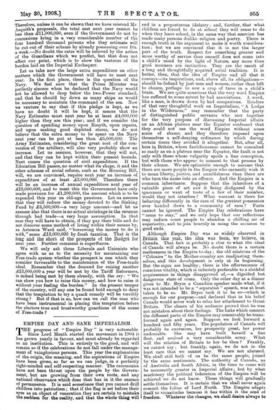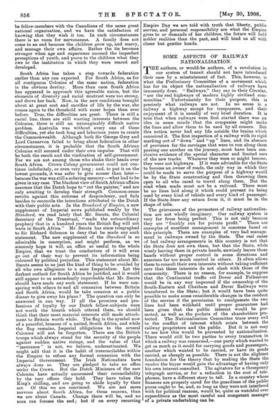EMPIRE DAY AND SANE IMPERIALISM.
T"progress of "Empire Day" is very noticeable. Since Lord Meath started the movement in 1904 it has grown yearly in favour, and must already be regarded as an institution. This is entirely to the good, and will remain so if the celebrations do not fall under the manage- ment of vainglorious persons. This year the explanations of the origin, the meaning, and the aspirations of Empire have been given, so far as we can judge, in a perfectly right-minded and self-respecting manner. The ceremonies have not been thrust upon the people by the Govern- ment, but are growing from their own roots, and any national observance which does that has in it the essence of permanence. It is said sometimes that you cannot drill children into patriotism ; that if the flag is set before their eyes as an object of veneration they are certain to mistake the emblem for the reality, and that the whole thing will end in a preposterous idolatry ; and, further, that what children are forced to do at school they will cease to do when they leave school, in the same way that coercion has made many persons dislike religion and poetry. There is enough truth in the argument to make it worth considera- tion; but we are convinced that it is not the larger part of the truth. Respect for something greater and more worthy of service than oneself does not come into a child's mind by the light of Nature, any more than good manners are instinctive. They are the result of a long and thoughtfully acquired social tradition. It is better, then, that the idea of Empire and all that it conveys—its inspirations, and, above all, its obligations— should be defined by just men and women, rather than left to chance, perhaps to sow a crop of tares in a, child's brain. We are quite conscious that the vary word Empire has suffered to some extent by bad associations. A word, like a man, is drawn down by bad companions. Readers of that very thoughtful work on Imperialism, "A Lodge in the Wilderness," may remember that the party of distinguished public servants who met together for the very purpose of discussing Imperial affairs on an African plateau near the Equator confessed that they could not use the word Empire without some sense of shame, and they therefore imposed upon themselves a, self-denying ordinance by which during certain times they avoided it altogether. But, after all, here in Britain, where fastidiousness cannot be consulted so easily as on a plateau near the Equator' the fault is not only with those whose vulgarity spoils a fine conception, but with those who appear to consent to that process by their silence. We are optimistic enough to assume that there are more people in the Empire who earnestly wish it to mean liberty, justice, and unselfishness than there are who turn the name into an offence. And the Empire is a common inheritance. Suppose that the inheritors of a valuable piece of art saw it being disfigured by the ignorance or want of taste of a few of their number, would they not interfere ? What warrant is there for behaving differently in the case of the greatest possession ever handed down to a, community of men ? Facts cannot be ignored. The Empire Day celebrations have "come to stay," and we only hope that our reflections may induce some people to abandon a chilling air of superiority, and. to join heartily in using the occasion to good ends.
Although Empire Day was so widely observed in Britain this year, the idea was born, we believe, in Canada. That fact is probably a clue to what the ideal of Canada will always be. No doubt there is a certain restlessness in the Empire to-day ; the old relations of the "Colonies" to the Mother-country are readjusting them- selves, and this development is only at its beginning. But the signs are healthy ; there is the effervescence of conscious vitality, which is infinitely preferable to a slothful acquiescence in things disapproved of,—a dignified but dangerous state of coma. Only the other day at a dinner given to Mr. Bryce a Canadian speaker made what, if it was not intended to be a " separatist ' speech, was at least taken to be so. Mr. Bryce took it to be so—which is enough for our purpose—and declared that in his belief Canada would never wish to relax her attachment to Great Britain. The cheers of his audience proved that he was not mistaken about their feelings. The links which connect the different parts of the Empire may conceivably be trans- formed again and again. Suppose we look forward a hundred and fifty years. The population of Canada will probably be enormous, her prosperity great, her power undeniable. She may have built herself a fine fleet, and evolved a. very considerable army. What will the relation of Britain to her be then ? Frankly, we cannot say ; but frankly, again, we do not in the least care that we cannot say. We are not alarmed. We shall still both of us be the same people, joined by the same sentiments. The authority of Canada, as of Australia and South Africa, in the time to come will be necessarily greater in Imperial affairs ; but by what machinery the political federation of the Empire will be achieved we do not know. These things will gradually .settle themselves. It is certain that we shall never again commit the follies of Lord North. The Empire adapts itself to vicissitudes because it has within it the seed of freedom. Whatever the changes, we shall desire always to be fellow-members with the Canadians of the same great national organisation, and we have the satisfaction of knowing that they wish it too. In such circumstances there is no room for nervousness. A family does not come to an end because the children grow up, and marry, and manage their own affairs. Rather the tie becomes stronger when age and experience succeed the imperfect perceptions of youth, and prove to the children what they owe to the institution in which they were reared and developed.
South Africa has taken a step towards federation earlier than any one expected. For South Africa, as for all contiguous Colonies of the same nation, federation is- the obvious destiny. More than once South Africa has appeared to approach this agreeable union, but the elements of diversity and racial mistrust were too strong, and drove her back. Now, in the new conditions brought about at great cost and sacrifice of life by the war, she comes again to the threshold with surer hopes than ever before. True, the difficulties are great. There is still a racial line, there are still warring interests between the Colonies, there is still an unimaginably difficult native problem. Australia was without every one of these difficulties, yet she took long and laborious years to create the Commonwealth. Although both Sir George Grey and Lord Carnarvon failed to bring about federation in other circumstances, it is probable that the South African Colonies will succeed under their own impulse. That will be both the result and the vindication of self-government. For we are not among those who shake their heads over South Africa. Crown Colony government could not con- tinue indefinitely, or even very long ; and, to put it on the lowest grounds, it was safer to give sooner than later— because the war was still a sobering memory—what had to be given in any case. The blackest view of South African affairs assumes that the Dutch hope to "cut the painter," and are only awaiting to develop their strength. Common-sense revolts against this extreme of despondency, and fails besides to reconcile the intentions attributed to the Dutch with their public acts. In the Standard of Empire, a new supplement of Imperial news published weekly by the Standard, we read lately that Mr. Smuts, the Colonial Secretary of the Transvaal, "made the extraordinary prophecy that in a hundred years the British flag will not wave in South Africa." Mr. Smuts has since telegraphed to Sir Richard Solomon to deny that he made any such statement. The new supplement of the Standard is so admirable in conception, and might perform, as we sincerely hope it will, an office so useful to the whole Empire, that we trust the conductors of it will even go out of their way to prevent its information being coloured by political prejudice. This statement about Mr. Smuts seems to us just the kind of thing to be avoided by all who owe allegiance to a sane Imperialism. Let the darkest outlook for South Africa be justified, and it would still appear to us antecedently improbable that Mr. Smuts should have made any such statement. If he were con- spiring with others to end all connexion between Britain and South Africa, would he take occasion at a public dinner to give away his plans ? The question can only be answered in one way. If all the promises and pro- fessions of loyalty by our Dutch fellow-subjects were not worth the breath which uttered them, we should think that their most material interests still made attach- ment to Britain worth while. The flag is the symbol now of a peaceful, because of a united, South Africa, and while the flag remains, Imperial obligations to the several Colonies will not be forgotten. There are the British troops which always stand for the security of the people against sudden native risings, and, the value of that " insurance " is not, we believe, underestimated. We might add that it is the habit of irreconcilables within the Empire to refuse any formal connexion with the Imperial Government. The Irish Nationalists have always done so. They are pledged to take no office under the Crown. But the Dutch Ministers of the new Colonies have actually announced their reconcilability by the very offices they hold. They have taken the King's shilling, and are going to abide loyally by their act. Of this we are convinced. We are not more nervous about South Africa, for these reasons, than we are about Canada. Change there will be, and no man can foresee the end; but if on every recurring Empire Day we are told with truth that liberty, public service, and personal responsibility are what the Empire gives to or demands of her children, the future will hold nobler realities than the past, and will bind us all with closer but gentler bonds.







































 Previous page
Previous page